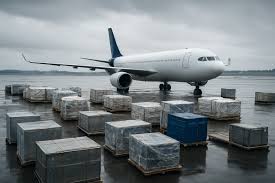Global shipping lines have been severely impacted by the series of disruptions caused by the ongoing conflict in the Red Sea region. The violence has forced shipping companies to reroute vessels, resulting in delays, longer transit times, and heightened anxiety in the logistics sector, given that a large amount of world trade passes through this strategically important canal.

Fluctuations in air freight services could result from increased tensions or conflicts in the Red Sea, creating uncertainty and volatility on international trade routes. Airlines may see an increase in the demand for expedited shipments as companies aim to avoid affected maritime routes and ensure prompt delivery of merchandise.
The length and intensity of the hostilities, as well as the success of diplomatic efforts to resolve the situation, will determine the long-term effects of the Red Sea conflict on the air freight sector. If disputes worsen or persist, there may be a more significant shift towards air freight as businesses seek to diversify their modes of transportation and decrease dependence on hazardous ocean routes.
The air freight sector will need to take a proactive approach to handling the situation, closely monitoring events in the Red Sea region and implementing backup plans accordingly.











